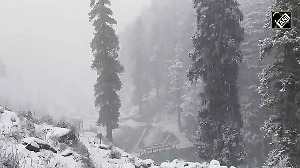It was the mother of all non-events. On a day when the Olympic flame was on Indian soil, the key task was to celebrate the human spirit behind the Games. But, the human element was missing, thanks to the devil called fear.
Fear of an attack on the Olympic flame by angry Tibetan refugees loomed large on Chinese minds. So the Indian government stage-managed the event in such a manner that the common man could neither see the torch nor cheer the torchbearers, which included the likes of athlete P T Usha, tennis ace Leander Paes and actor Saif Ali Khan.
Coverage: Tibet Revolts
Senseless security measures ensured that the event was devoid of laughter and cheer. The 300-odd crowd at India Gate was all carefully selected by Coca-Cola, Lenovo, Samsung and the Indian Olympic Association. The people who were sponsored to join in were not even smiling broadly. They felt awkward in the vast stretch of land around them where media-persons were exchanging stares with cops.
Commander G Nandy Singh, winner of two Olympic gold medals (1948 and 1952) and the Dhyan Chand award, told rediff.com after the torch relay: "Everything was quite strange. We were running and securitymen were watching us. There was nobody else to watch us due to a three-rung security arrangement. It was not a good function where the general public was cut-off."
Deep fear in the minds of the Chinese establishment took Indian security to a ridiculous level. India pledged to Beijing that it would provide the best possible security to the Olympic flame, which had come under attack from pro-Tibetan activists in London, Paris and San Francisco.
Thus India tried to be 'holier-than-thou'. It tried to stop unarmed Tibetans, who have no terrorism record, with a massive show of police power. A senior Malayali scribe, who subscribes to Left ideology and is highly sympathetic to China, wondered why the Indian government agreed to arrange such a function in the first place.
Obviously, the Tibetans were upset by democratic India's muscle power.
Tenzin Tsundue, Tibetan poet and activist, told rediff.com: "We didn't do anything to the torch, but the torch has left with more dirt on it. The event proves that China is capable of using anybody and everybody. At the end of the day we know China can be as brutal as those in other countries."
While echoing Tibetans' feelings, he said: "Thursday's security arrangement around the venue indicates China's desire to control the people's expectations for freedom. If you put India and China together you are talking about more than two billion people. Tibetans in India are just 1.20 lakh. We can only make protests."
Naturally, the show of excessive security in New Delhi needs to be condemned.
"We lost an opportunity to showcase the balance," said Kiran Bedi, who returned the invitation to join the torch relay when she came to know about the enhanced security arrangements.
Thursday's relay justified her stance, she feels. She said, "Yes, we made it. Yes, in India, Tibetans or their sympathisers could not touch the torch. But, we have done it at a heavy cost. Each one of us paid a price."
She says, "Indian police officers are well-trained in handling crowds. They face much bigger numbers than any Western police officers. Instead of such a show, we should have allowed children, sports lovers and other public to join in. Democracy is all about balancing. India lost the opportunity to show to the world that it allowed Tibetans to express their anger and at the same time allowed the spread of the Olympic spirit among its people. We have lost."
When asked about the message India gave by providing a quiet and safe passage -- with help of excessive security measures -- to the Olympic flame, former ambassador M K Bhadrakumar said, "The government acted appropriately in providing fool-proof security for the Olympic torch -- in consonance with India's responsibility as a member of the international Olympic movement and keeping in view our obligations as a friendly neighbour of China. Security measures are never 'excessive' when threat perceptions are real, which seems to be the case here."
Former foreign secretary Kanwal Sibal disagreed with him.
Sibal said, "On one hand, we have to bear in mind that the government of India had certain difficulties in carrying out the commitment to provide safety around the torch. At the same time, we can't go beyond our limits because we are a democratic country and cannot suppress the Tibetans' political right of expression.
"India is not positioned in the same way on the issue of Tibet as other countries. China has a claim on Indian territory. On the issue of Tibet, China and India have a clash because Tibetans are in India and protesting against the control of Tibet. India can't deny giving legitimate room as much as possible to vent the Tibetans' anger."
Talking about security, Sibal said India should not have positioned itself in such a way that it looked as if it was done under Chinese pressure.
The former foreign secretary was also upset with the sportsmen who ran with the torch.
He argues, "I would have wished that the torchbearers in India had made a point to the Chinese on behalf of India. They should have told the Chinese that Tibetans are an aggrieved people. By giving a quiet and safe passage, the larger Indian interest was not served."
However, Sibal's arguments are debatable.
Bhadrakumar disagreed, saying: "There is no need to front-load an already complex relationship. Besides, theatrics cannot substitute for diplomacy. Again, the West would not orchestrate this campaign beyond a point. Why should we want to be used as a doormat?
"The temptation to score a transient point on a sunny Thursday afternoon on a Delhi street may seem irresistible, but our interests are best served by working consistently to improve relations with China for what is obviously a long haul. Like in our relationship with Pakistan, it is only in a climate of mutual trust and confidence that intractable differences can be addressed. I can't see any short cuts here," he added.
The fundamental issue to note is that the Indian government's stand reflects the consistency. There is no basic change in India's Tibet policy. The government has taken a clear stand of not upsetting China in its weaker moment.
There is no doubt that the Tibetans' protests is all about timing. China feels embarrassed every time there is a protest against the torch. The Tibetans' agenda is being served with their non-violent protests, which it seems will continue for some time.
Prime Minister Manmohan Singh has not changed India's ongoing policy of India over the issue of Tibet. Since the last five decades, India has not changed its basic stand, said a highly senior officer in the ministry of external affairs.
In an informal conversation last week, the MEA official said: "Over and over and over again India has said that Tibet is an autonomous region of China. India's policy of 1959, 1962 and of subsequent years has not changed. The rest is just matter of details."
Dr Singh termed the Dalai Lama as the greatest living Gandhian just when Beijing accused him of plotting riots in Tibet. At the same time, his government, behaving responsibly, assured China that it will give safe passage to the Olympic torch.
"It is India's responsibility," assured Indian officials to the Chinese government. And India showed off clumsily that it can maintain law and order. As was visible, it did provide security in excess.
India is sending the message, notwithstanding the overkill by security, that India's position is unique on the issue of Tibet. It has done more for Tibetans than any other country.
Democratic India will not ban anti-China demonstrations, but neither is it likely to change its official position on Tibet in the near future nor its support to the 'one-China policy'.
At the end of the day, one sees with awe a remarkable political achievement by the Tibetans -- the two great emerging powers were stopping them in their march towards the Olympic torch.
It was a psychological victory for the Tibetans that they could scare the Chinese even if for a moment.
The Olympic torch relay is being debated more for the show of strength than the spirit it represents. With regard to the complex issue of Tibet, Sino-India civilisational links run so deep that when the timeline and today's realities are given a closer look, such victories seem an illusion.
At the India Gate on Thursday, the fascinating triangle of Tibet, India and China transgressed the known criteria for victory and defeat.






 © 2024 Rediff.com -
© 2024 Rediff.com -